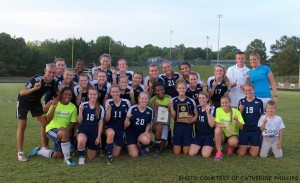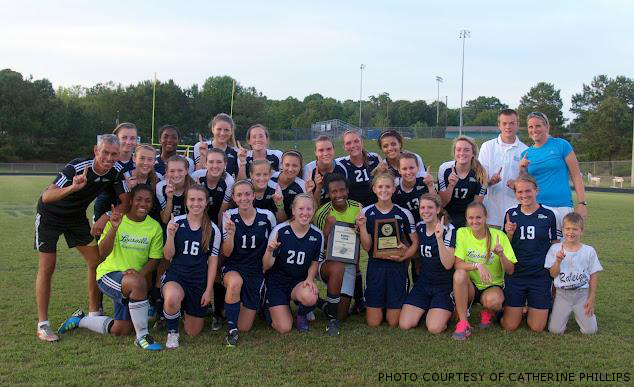
An article on usnews.com found that 55.5% of all high school students played a sport during the 2010-2011 school year. But after examining the wide range of social and academic benefits of being a student athlete, I believe that percentage should be even higher.
There are obvious social benefits of playing high sports. Students have the opportunity to meet people with the same goals: to win and improve. Students on sports teams find a sense of brotherhood with their respective teammates, enabling them to form friendships and not only survive but also thrive during high school.
Coach Pyper, Leesville’s JV football coach, has noticed the community that high school sports form, not only within the team but also within the school.
“The coach, [his] style, and the school all play a role in forming a community. This is a very big school, but we have huge community sports. Sports has in it a camaraderie that you can’t really teach. That’s part of why the volleyball team went all the way. They had that special something and the community was behind it ,” said Pyper.
“Sports bring about a special loyalty you can’t find in other things,” added Pyper.
Lamont White, Leesville varsity basketball player, also appreciates the sense of community that he has found on his high school sports team.
“Sports definitely form a community. [Sports teams] help you meet new players that become your friends, possibly your best friends,” said White.
While there are clearly great social benefits that stem from participating in high school sports, various research proves that there are even academic advantages as well.The National Federation of State High School Associations (NFHS) states that in general, student athletes “have higher grade-point averages, better attendance records, lower dropout rates and fewer discipline problems” than students who don’t play a sport. Those facts dispel the notion that sports are just a distraction from school work.
Sports are a huge incentive for student-athletes to do well academically in order to be eligible to participate. The North Carolina High School Athletic Association (NCHSAA) requires student-athletes to pass at least three of their four classes if they are on the block schedule (as Leesville is).
White acknowledges the importance of good grades, as it affects eligibility.
“You’ve gotta do well in school to be able to play. Sports give you motivation to come to school,” said White.
Other studies show the long-term benefits that high school sports have. In 2007, a Brigham Young University study found that females who were on a sports team in high school were 41 percent more likely to graduate from college than girls who didn’t play a sport.
Even studies that took place in the ‘90s proved that student athletes did better academically than their non-athletic peers. Dr. Roger Whitley, along with the North Carolina High School Sports Association (NCHSAA), studied high school athletes during the 1993-1994, 1994-1995, and 1995-1996 school year. Whitley’s conclusion was that high school students who were on a sports team did better academically than nonstudent athletes. Whitley considered five aspects when comparing the the athletes and nonathletes: grade point average, attendance rate, discipline referrals, dropout rate and graduation rate. With each category, the athletes outperformed the nonathletes by a wider margin. For example, the average dropout rate for athletes was .7%, while for those who weren’t involved in sports the dropout rate was was 8.98%. The average GPA for student athletes was 2.86, while for nonathletes it was only 1.96.
One factor that has a huge influence on keeping good GPA’s throughout the season is accountability. Coach Pyper believes in the importance of accountability–the need for teammates and coaches to hold themselves and other to a high standard on and off the court/field.
“I, personally, have put some things in place over the years that have made accountability such a huge factor. I think [accountability] is huge; that you have teammates and friends that can not only tutor you, but they can make sure you go get help,” said Pyper.
White agrees, adding that if you play sports in high school, you don’t want to be the teammate with bad grades. If you’re a student athlete, “you’ve got to put the student first,” said White.
This is not to say that all people who play sports are smarter or work harder than those who don’t. Rather, these studies point out that sports in high school are beneficial for a variety of reasons: they create a sense of community and camaraderie and teach students how to work hard, have good discipline, and and hold others to a high standard. And all of those factors lead to low dropout rates and good grades.
And isn’t that what every school wants?

Leave a Reply